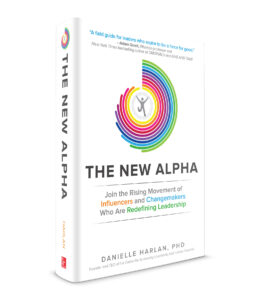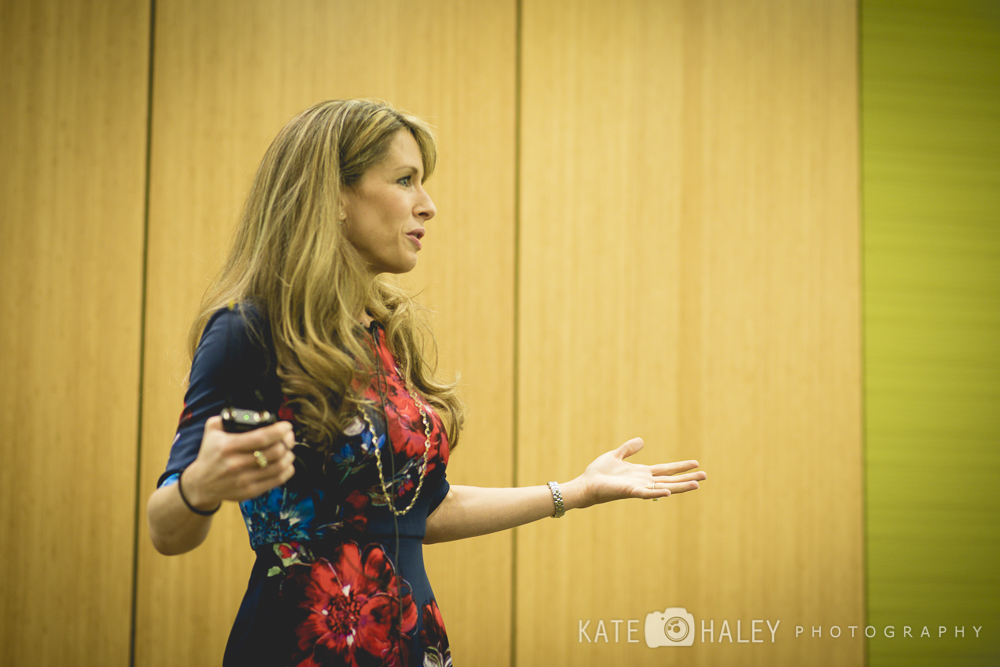Your Personal Leadership Identity
You have a personal leadership identity that has the potential to influence and motivate others. Achieving results and driving others to a common vision are within your reach when you focus on that uniqueness.
What you need is to think about your differentiators.
One of the reasons I study leaders and various leadership styles is because each of us can learn something from the greats while moving toward our own uniqueness.
And that’s why Danielle Harlan’s book, The New Alpha: Join the Rising Movement of Influencers and Changemakers Who Are Redefining Leadership, appealed to me. She packed this book with advice on how to become the best version of yourself and to use your influence for good.
Danielle Harlan, PhD is the Founder & CEO of the Center for Advancing Leadership and Human Potential. She completed her doctorate at Stanford University and has taught courses at both Stanford Graduate School of Business and U.C. Berkeley Extension’s Corporate and Professional Development program.
I recently asked her about her new research, focusing specifically on her concepts of a personal leadership identity.
Your Unique Identity
What is a Personal Leadership Identity?
 Personal Leadership Identity (PLI) is the unique combination of qualities and talents that make you unique and distinctive as an individual and that you can easily and naturally draw upon in order to enhance your leadership effectiveness.
Personal Leadership Identity (PLI) is the unique combination of qualities and talents that make you unique and distinctive as an individual and that you can easily and naturally draw upon in order to enhance your leadership effectiveness.
The example that I share in The New Alpha is about a new manager who struggled as a “stern and commanding” leader (which matched the “image” that he had in his mind of how good leaders should act) but had a breakthrough when he identified his PLI, which was actually the total opposite of this. As soon as he found his “real” self, his leadership effectiveness increased dramatically.
The big idea here is that many of us have this “cookie cutter” image of the “type” of person who makes a good leader, but the reality is that each of us is at our most powerful, and our most impactful, when we allow the best aspects of who we are naturally to guide our leadership “style.”
Knowing your PLI is also really helpful in terms of creating a vision and plan for our lives—based on who we actually are, rather than who we think we should be.
Make Work the Pursuit of the Meaningful
How can you use it to determine whether you’re in the right role and pursuing the right vision?
At its best, your career should be a professional manifestation of your Personal Leadership Identity…if there’s general alignment between your PLI and what you’re doing or where you’re headed, then you’re in the right role and pursuing the right vision. If not, then it might be time to think about how to change or adapt your role to better suit your PLI, or to make a career pivot.
This is, of course, much easier said than done, and many of us put off the hard work of aligning our life and career to our Personal Leadership Identity because it’s a big task and we’re busy. However, not addressing this disconnect only results in deep misalignment and unhappiness in the long run. In these cases, instead of work being an opportunity to pursue what gives us a sense of meaning and purpose, it becomes a chore that we must do in order to survive, pay our rent or mortgage, etc.
How to Define Your Personal Leadership Identity
What’s the best way to define your Personal Leadership Identity?
Chapter 6 in The New Alpha book spells out a step-by-step processing for doing this, but the gist is that our Personal Leadership Identity doesn’t usually come to us out of thin air; rather we uncover it by reflecting on our life and experiences and by identifying the values, strengths, skills, passions, and ideal conditions that have facilitated our best and most enjoyable successes.
For example, if you ask me what qualities I bring to the table as a leader, I might say that I’m intelligent, empathetic, and gritty. However, if you ask me to reflect on my best successes as a human being—those where I achieved something AND enjoyed doing it, and then asked me to analyze these accomplishments in terms of what they tell me about the aspects of my personality that I could draw upon in order to be a good leader, I might find intelligence, empathy, and grit in there—but I might find other more unexpected qualities too—like love, curiosity, and a sense of humor.
This retrospective and holistic approach often yields more interesting aspects of our PLI than we might come up with by simply “naming” our best qualities or relying on other people to tell us what we’re good at.
Do you have an example or story of someone who understood this concept and how it changed their future or perspective?
Yes! I’ve actually experienced this myself. A long time ago, I was telling a friend of mine about a situation at work and how I reacted, and she responded by saying, “Oh—you’re a nurturer!” And I was honestly kind of annoyed with her response because I felt like she was just ascribing typically “feminine” qualities to my approach to leadership. I thought, “No way—I’m not nurturing—I’m tough, and I’m strong, and I like data-driven decision-making!”
And for a long time, I resisted her description because I thought that I couldn’t be all of those things and be a “nurturer,” but over the course of my professional career, I’ve realized that it was I who was wrong—not her. As it turns out, I am nurturing—and tough, and strong, and data-driven. And being one of those things doesn’t preclude the others. In fact, being all of those things is a really powerful combination—I have the ability to think critically and be appropriately assertive and brave, while also being kind, empathetic, and empowering.
Once I realized this about myself, everything in my life and leadership suddenly fell into place (and frankly felt a lot easier because I wasn’t resisting who I naturally was).
How does Personal Leadership Identity impact group dynamics?
This is a great question! In my experience, when people understand and harness their Personal Leadership Identity, they’re naturally more powerful and influential (because people detect their authenticity and naturally gravitate toward them), but knowing and using your PLI isn’t an excuse for throwing emotional intelligence out the window.
Obviously, in any group situation, you want to read the other people and figure out how to adjust your behavior in order to work productively together. I think the part that really experienced New Alpha leaders do well is finding that perfect balance between being themselves and flexibly responding to the needs of the group. This can be tricky at first, but we can learn by paying attention to what works and what doesn’t and then improving our performance over time.

Tell me about The New Alpha. What’s your vision for a new generation of leaders? How is it different?
The New Alpha book is a field guide for leaders who want to achieve big goals, while also being happy healthy human beings and a force for good in the world. In my experience, there are a lot of leaders out there who are revered simply for taking on big goals and getting them done, and frankly, I think we should ask for more from them—and from ourselves.
The ability to get the job done is great (and a necessary component of being an effective leader), but the New Alpha leaders are more than just high achieving. They are kind, ethical, creative, curious, visionary, and the kind of people who will sacrifice their own personal gain in order to do good for their organizations and communities in the long run.
We live in a world that’s hungry for heroes—leaders who are not just great, but also good, and the approach outlined in this book is all about giving readers what they need to be great and good.
Is it time to change your current course for a better one? By signing up for FREE to Leadership Insights, you will be on your way![/subscribe]
The New Alpha: Join the Rising Movement of Influencers and Changemakers Who Are Redefining Leadership

